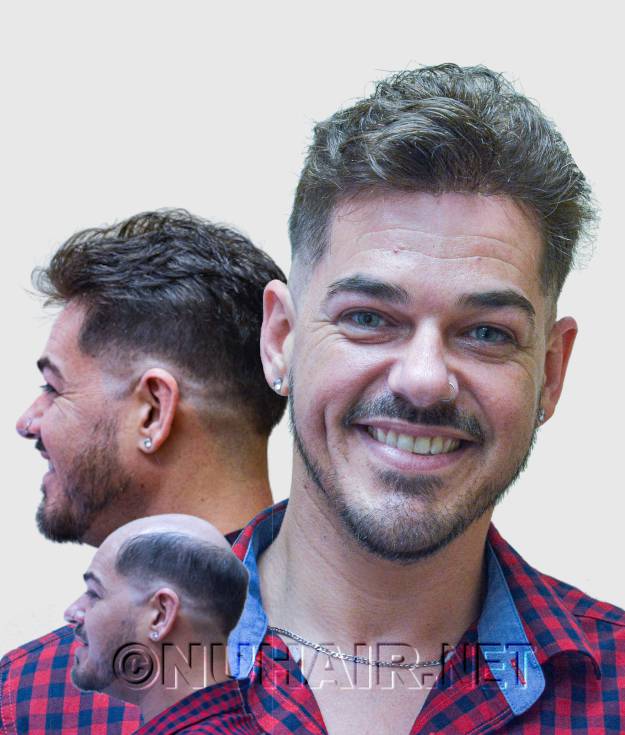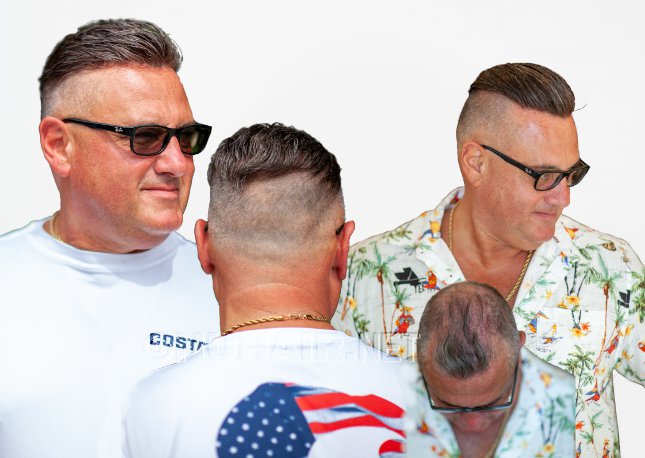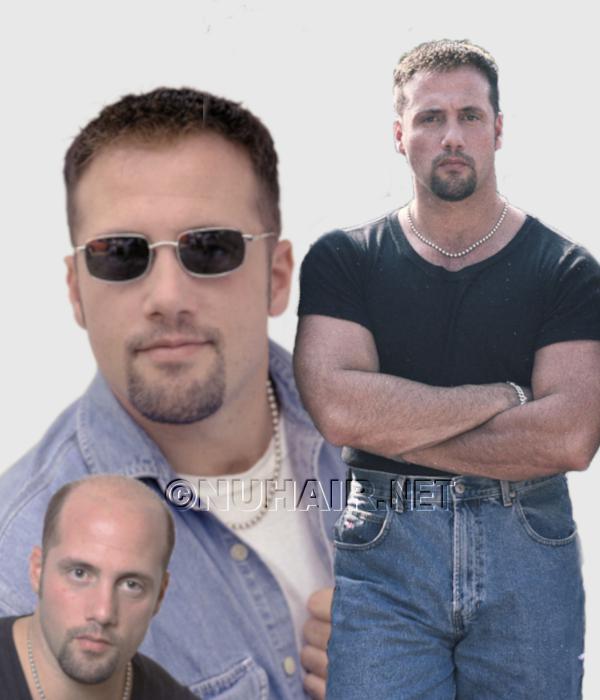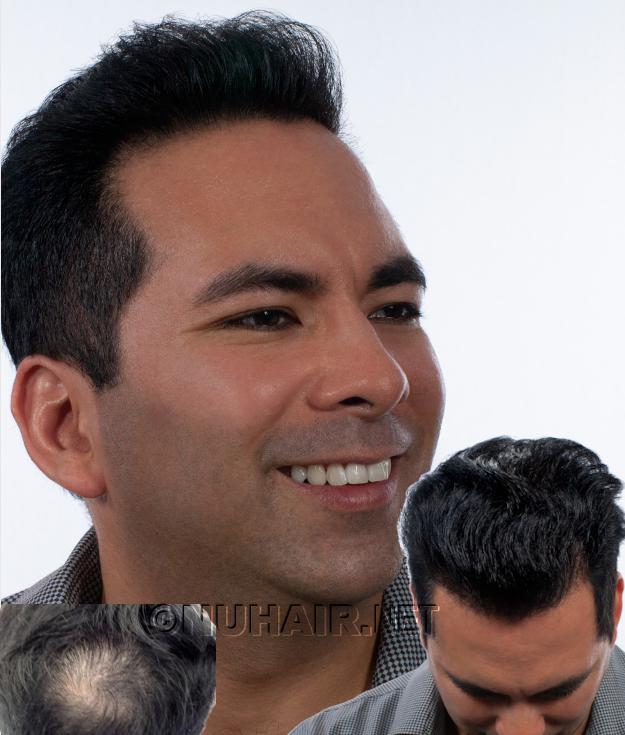Men's Hair Loss
Hair loss in men, male alopecia causes & treatments: men’s hair loss is a medical condition as abnormal hair falls out. US doctors differ in hair loss treatments. Treating men’s hair thinning is best to start with laser hair growth therapy, Nu Hair of Dallas, Texas, hair restoration specialist says.

male Hair loss
male Alopecia problem
Men’s Hair Loss & Baldness
Many men experience hair loss, male pattern baldness, or various dermatological hair loss conditions in their lifetime. The number of hair on a healthy scalp is approximately 100,000. And men experiencing hair shedding at the rate of more than 125 hair fall per day is considered a hair loss problem.
If you are experiencing baldness or thinning hair, you are not alone. Many men experience hair loss and male pattern baldness in the USA. According to the American Academy of Dermatology, men losing hair statistics:
- Over 66% of men will experience hair loss by thirty-five.
- About 85% of men have drastically thinner hair by the time they reach fifty years old.
- It can occur as early as the 20s, and it’s in increasing numbers.
- And 16% of men see the first signs of hair loss from 18-29.
- Hair loss increased with age 53% of men 40-49.
- Men’s hair loss starts at some point in the twenties, and in most cases, it takes 15-25 years to have a large area of baldness.
- Two in every three men in the United States experience baldness or thinning hair loss.
- Androgenic Alopecia is a hereditary hair loss condition affecting most aging men.
Male Pattern Baldness
Men’s Hair Loss Symptoms
Male hair loss progress to various degrees of baldness. Male hair loss typically begins with the crown and front hairline and develops a balding area. In contrast, others develop hair loss by showing thinning hair all around the scalp. Some individuals have complete hair loss or total baldness within a short time.
The telogen effluvium stage is when a large percentage of scalp hair is in the “shedding” phase. Genetics plays a significant role in hair loss in men. Androgenic Alopecia – male pattern baldness is genetic.
To clarify, we use several names for male hair loss:
- Men’s hair loss
- Men’s Androgenetic Alopecia
- Male pattern baldness

Male Hair Loss Causes
Common causes of hair falling out in men
- Androgenetic Alopecia, male pattern baldness, genetics
- Thyroid gland abnormalities
- Severe illness or major surgery
- The immune problem, i.e., Alopecia Areata, Lupus
- Tinea Capitis – fungal infection called scalp ringworm
- Stress-related hair loss
- Fast weight loss
- Vitamin deficiency
- Medications
- Anagen effluvium is nonscarring Alopecia commonly associated with chemotherapy and radiation.
- Hairstyling & over-processed hair
Men’s androgenetic alopecia, pattern baldness
Men’s hair loss, male pattern baldness, or androgenic is hereditary because of high levels of androgens. In men, male pattern baldness, also called Androgenic Alopecia, is a genetic hair loss condition that causes hair thinning or baldness in about 50 million men in the USA. In men, pattern hair loss is part of aging and genetic traits.
- With 40% of men showing noticeable hair loss by age 35
- More than 50 percent of males over 50 experience some hair loss.
The typical pattern of hair loss in men is receding hairline from the lateral sides of the forehead, and the crown area is characteristic. The Norwood Classification Scale shows the prevalence of mid-frontal hair loss increases with age.
It is most likely affected by male hormones called testosterone. The follicles shut down in response to DHT, a by-product of testosterone. “As a result, over time, an excess build-up of DHT in the follicle causes it to begin shrinking, which in turn alters the natural resting and growth phases of the hair,” says Reed, clinical associate professor of dermatology at NYU Medical Center.

Health & hair thinning in men?
Medical health cause to men's hair falling out
Health, steroid & men’s hair loss
Most importantly, using steroids may jeopardize one’s health. Subsequently, the side effects of steroids can cause men’s hair loss. For instance, long-lasting side effects include premature balding or thinning hair, dizziness, depression, aggression, or hallucinations. Likewise, sleep problems, nausea, high blood pressure, aching joints, liver damage, urinary problems, and increased risk of strokes may arise.
Scalp Condition
Dermatological cause & symptoms of losing hair
Ringworm of the scalp is a fungal infection affecting the hair follicles, resulting in hair loss. Furthermore, skin cancer can directly destroy hair follicles. Conditions like lupus and fungal infections of the scalp, such as eczema, may cause hair loss.
Indeed, improper hair styling scarring alopecia occurs in African-American men due to persistent tight braiding of hair, inflammation of hair follicles, and subsequent scarring. Importantly, chemical hair treatments, done improperly, such as perms and hair straightening, may cause hair loss due to hair root damage.
Medical hair loss causes
Medical & health causes
Some illnesses may lead to thinning hair, including circulatory disorders and arthritis. Others that can cause hair loss are thyroid disease, overactive or underactive thyroid gland, syphilis, and even high fever. In addition, conditions such as lupus or diabetes and fungal scalp infections, such as eczema, may cause hair loss.
Thyroid hair loss
Rapid hair loss is one of the thyroid problem symptoms, with large amounts of hair falling out in the shower or sink. The hair’s texture is dry, coarse, or easily tangled, and an itchy scalp can occur. A unique symptom of hypothyroidism is hair loss on the eyebrows’ outer edge. Hair regrowth is usual with successful treatment of thyroid disorder. But it takes several months. Also, prolonged or excessive hair loss can be a side effect of thyroid medications.
Alopecia areata hair shedding
Alopecia areata is an autoimmune disease, a nonlife-threatening hair loss condition. The disease causes hair to fall out in clumps as bald spots start to show, which may progress to complete hair loss. However, some lose their hair with bald spots in specific areas and others with thinning hair all over.
medications & hair shedding
Medication side effect
Prescription drugs, chemo, and radiation therapy cause hair to fall out. Medications, such as blood pressure drugs, Beta Blockers for depression can be the reason. Also, Naproxen Sodium (Nuprin) and others may initiate temporary hair shedding. Likewise, excessive iron or vitamin A intake is toxic and can cause hair loss.
Sources:

Stress & hair loss
The unexpected loss of hair
Balding stress
Baldness connotes our image-driven society’s unattractiveness, physical weakness, or old age. Low self-esteem and vulnerability stem from an individual’s perception of a beautiful body image. Studies reveal that handsome, healthy, and attractive are related to a person with a full head of hair. Indeed, research show employment discrimination is based on a person’s appearance. People with hair loss do not get job opportunities in many companies that promote a youthful image and strength. They worry that others are looking at their thin or balding hair.
The balding effect on men
Single men and women who had begun losing hair in their early twenties are more likely to suffer emotionally, being less attractive than others by looking older than their actual age. Balding men reported glancing in the mirror constantly and wearing hats even in warm weather. They feel frustrated and helpless about their hair loss and worry about others’ thoughts.
Treating male Hair Loss
Show & tell balding signs?
When to see a doctor?
You should see a medical professional if you see rapid hair loss, hair clumps in a shower and brush, or hair loss in patches. Dermatologists can diagnose if you are experiencing male pattern hair loss due to aging. A sudden hair loss can signal an underlying medical condition. Let your family doctor make a complete diagnosis, including your thyroid condition. Thinning hair is just one of the many symptoms that may suggest a low or hypothyroid disease.
Medical diagnosis, prevention & treatment
Indeed, a dermatologist can help you get an early start and a chance to grow new hair again. “If you see an abnormal rate of hair fall, start controlling it with treatments as soon as possible,” says the Dallas hair restoration specialist. Most common is treating Alopecia with medical hair regrowth therapy, laser treatments, or hair growth medications.
Nonsurgical treatment options for male hair loss
Hair systems and wigs are the most common hair restoration solution, especially for a total or a sizeable bald scalp area. Notably, the FDA has cleared a new medical device, the MEP-90 laser, to treat thinning hair. Dermatologists use this laser to treat men’s hair loss as a hair growth treatment. Under FDA supervision, our MEp90 laser clinical data has proven measurable hair growth results.
Show & tell balding signs? Nu Hair of Texas is a hair loss (alopecia) treatment center in Dallas-DFW. We are proud to be one of the USA’s oldest companies, offering hair replacement solutions with the highest quality and service rating. Get the best hair restoration treatments:
- Medical laser hair growth therapy
- Nonsurgical hair replacement systems and hairpieces
- Medical wigs for hair loss
Our Texas hair restoration specialists in Dallas evaluate and design the best hair restoration for your needs. We are committed to helping you regain fuller, natural appearing hair and live carefree with confidence. After all, your hair should inspire a look of healthy living. It’s who you are and a reflection of your lifestyle.
Let's Get Hair
Discover easy ways to get your beautiful hair back and tips to optimize your hairstyle. To schedule your private no-obligation and “no pressure” consultation, use the CONTACT form with any questions or concerns.
By Appointment Only.


